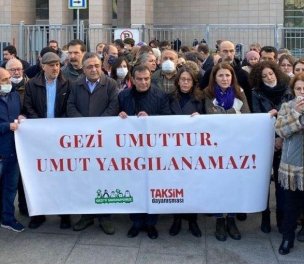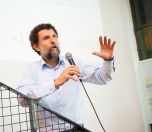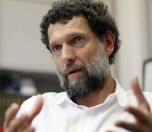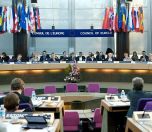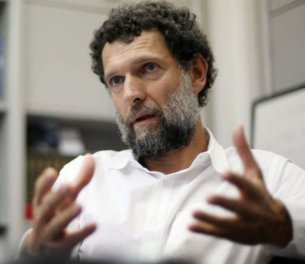Courtroom sketch depicting Kavala at the hearing in June 2019 (Drawing: Murat Başol)
Click to read the article in Turkish
We are publishing the full text of the defens statement of Osman Kavala, the only arrested defendant of the Gezi trial. Kavala has been in Silivri Prison, İstanbul, for 1,438 days.
CLICK -Merged with çArşı case, Gezi trial resumes: Attorneys leave courtroom
❝I was detained on 18 October 2017 and arrested on 1 November 2017, without being interrogated by the prosecutor, on two charges: "attempting to overthrow the government" (Article 312 of the Turkish Criminal Code) and "attempting to change the constitutional order by using force and violence" (Article 309 of the Turkish Criminal Code). The first charge was based on the claim that I had planned, organized, orchestrated and financed the Gezi Park Events while the second was based on the claim that I had taken part in the attempted coup of 15 July.
In February 2019, the two charges were disjoined on the grounds that there was no legal or factual connection between them and the Gezi indictment was prepared on the basis of the first charge only. The detention order was also split in two so as to be applicable to both files.
On 11 October 2019, the detention on charges of participating in the attempted coup was lifted and the other detention order was continued until the Gezi trial resulted in acquittal on 18 February 2020.
I was detained again a few hours after the President's public remarks criticizing the court's verdict of my acquittal and I was re-arrested one day later, again without being interrogated by the prosecutor, on the grounds that I had supported the attempted coup, a charge of which I had already been released earlier.
On 9 March 2020, I was arrested on a new charge, "espionage" (Article 328 of the Turkish Criminal Code), based on the investigation file concerning my participation in the attempted coup and based on the same evidence.
My detention for the charge of participation in the attempted coup was lifted on 20 March 2020.
The ECtHR's unanimous judgment of 10 December 2019, which established the fact that there existed no concrete evidence to support the allegations of attempting to overthrow the government and change the constitutional order and its majority decision that established the presence of ulterior purpose in my arrest, became final on 12 May 2020 despite the objections of the government. Nevertheless, my detention persisted on the grounds that I was detained for a new crime, that of "espionage".
On 29 September 2020, the charges of participation in the coup attempt and espionage, which were based on the same file and therefore the same evidence, were combined in a single indictment. A major portion of the Gezi indictment, the trial of which resulted in acquittal, was seen to be copied into the new indictment as well. The prosecution claims that this was done in order to explain the connection which could not be previously demonstrated between the two cases. However, the fact that the prosecution feels the need to resort to something like this shows that he is not unaware of the lack of concrete evidence and reasoning to corroborate the accusations at hand.
On 22 January 2021, the Istanbul Regional Court of Appeal overturned the decision of acquittal in the Gezi trial and expressed its opinion that joining that lawsuit with the new one that included the other charges against me would be appropriate. Thus, charges which were formerly decided to be factually and legally unrelated were joined without any fresh evidence and the lawsuits about me were joined with the Çarşı case again without any new evidence.
This chronology and this string of events that culminated in the merging of the files seem to indicate the presence of an intervention in the judiciary process and a politically tainted judiciary undertaking serving to prolong my imprisonment for the purpose of keeping live the perception of my being guilty on the one hand and criminalizing the Gezi protests as an act of rebellion -although the evidence points to the contrary- on the other.
What is striking about the charges brought against me is not merely the fact that they are not based on any evidence. They are allegations of a fantastic nature based on conspiracy theories overstepping the bounds of reason.
The Gezi indictment claimed that the Gezi protests were planned by actors from abroad, that they were financed by George Soros, and that I had transferred his funds to the protests and organized and orchestrated the events. As shown by the accusation of supporting the coup attempt directed at me concurrently, this plot reflected and lent credibility to the discourse adopted in political circles in the aftermath of the 15 July coup attempt about the association of the Gezi protests with the coup attempt. What is interesting here is the fact that this plot was put together at the time of the Gezi protests by officials from the Anti-Smuggling and Organized Crime Department (KOM Department) who would later be indicted and put on trial for FETÖ membership and it served as the basis of an investigation launched by prosecutors who were also charged with FETÖ membership.
The totally unsubstantiated allegations in the Analysis Report dated 14 July 2013 annexed to the Gezi indictment were copied verbatim as they had been written. At the end of the indictment, it is clearly stated that the wiretappings were carried out by individuals affiliated with FETÖ/PDY and that they were "re-evaluated" to be used as evidence.
This fact was expressed in the acquittal verdict of the Gezi case with the phrase "poisonous fruit from a poisonous tree." However, even if the so-called evidence had been obtained lawfully, the result would not have changed. As the Chief Justice of the Constitutional Court Zühtü Arslan stated in his dissenting opinion in the Court's judgement on my case and as affirmed by the ECtHR in its judgment, the material presented did not qualify as evidence of a crime.
The plot in the Gezi indictment was based on two allegations: that I had transferred funds obtained from Soros to Gezi Protests and I had steered the protest activities of non-governmental organizations through a secret "structure" operating under my instructions. That there exists a secret entity operating like a crime syndicate under my command is a contrivance with no factual and hence evidential basis which defies all reason.
It is a fact corroborated by real-life experience and established by an extensive body of credible research that the Gezi protests were not directed by any person or organization. In the past, claims that people unacquainted and unassociated with each other were in collusion in a plot to overthrow the government had been used in countries with authoritarian regimes in order to eliminate or intimidate opponents. A similar conspiracy theory and a fabricated organizational structure had been also used in the Ergenekon case in Turkey. The fabricated secret entity in the Gezi indictment gives the impression of its having been copied from the Ergenekon indictment.
As a result of the merging of the Gezi and Çarşı cases, people from the football team supporters of the Çarşı group have also been included in this secret entity, which has made the fantasy even more surreal. I had neither any acquaintance of nor any relationship with the people accused in the Çarşı case either before or during Gezi. That they do not know me either is in keeping with the normal course of things. As I read in the minutes of the hearing on 12 July, when Counsel Volkan Bahadır asks the suspect Y.D. if he knew Osman Kavala the answer he gets is "What team is he playing in?" It is unthinkable anyway that members of the close-knit Çarşı group who interact as Beşiktaş football team fans and identify themselves as such would stage a demonstration at the behest of an outsider. To the best of my knowledge, the world has yet to see the fans of a football team organize a riot to topple those in power either.
A yet graver claim in the indictment is linking the protests with the funds or resources allegedly transferred by me. The report by MASAK (Financial Crimes Investigation Board of Turkey) affirmed that I had not transferred any funds in relation to Gezi. The prosecution's claim that the Gezi protests had been organized with the power of money is demeaning not only to those accused here but also to everyone who participated in the Gezi protests. People from different quarters with differing opinions have participated in these protests. What brought them together was their reaction to the implementation by nondemocratic means of a project inimical to public interest that would lead to the loss of a park used as a recreational area by many young and old people from different social classes. The truth the prosecution distorts out of shape is that the millions who participated in the Gezi protests were people with dignity who acted of their own will in order to exercise their democratic rights.
I have never organized any mass demonstration and never been asked to provide financial support for one so far. I did, however, participate in many demonstrations and marches in solidarity and equal status with those present. The purpose of these actions was not to topple the government but to give voice to reason and conscience and to warn governments against taking any steps that would run against public interest and democracy – as in the protest rallies against the invasion of Iraq.
The allegation that I participated in the 15 July coup attempt is slanderous; it is an assassination attempt at my dignity and it is totally devoid of evidence just like the accusation of espionage that was fabricated later. Although the persons who came up with trumped-up charges against me are known to be accused of and put to trial for FETÖ membership themselves, it is claimed that I was in contact with the secret representatives of FETÖ/PDY in order to organize the coup attempt and collaborated with them in the coordination of the names of the individuals who would take part in the government to be formed after the coup. Going even beyond a claim, the allegations are presented as determined facts. These are statements that defy reason and logic, they are lies aimed at misleading justice. The crime of espionage imputed to me after the ECtHR's unanimous judgment that my arrest was not backed up with concrete evidence and constituted a violation of rights tends to verify the ECtHR's decision concerning the existence of ulterior political motives playing a role in my arrest.
On page 60 of the indictment, the Prosecution claims that the crime of espionage is not explicitly defined in the law and makes up an espionage crime with no regard for its legal definitions, thus believing itself to be freed of the obligation of describing the secret information which is the subject of the act of espionage and explaining where and how it was obtained. Instead, in a crude attempt at denigration, the involvement of Anadolu Kültür, of which I am the Chair, in cultural activities related to our Kurdish and Armenian citizens has been put forward as evidence of espionage without any reference to the content of these activities. The prosecution's depiction of the activities involving minorities as evidence of espionage is reminiscent of the arbitrary charges of espionage based on the law of treason in Nazi Germany where people were identified in racial terms and minorities were viewed as potential criminals.
The prosecution's making up different accusations using the same evidence and its manipulation of the law is an example of perpetrator oriented criminal law. In his article where he drew attention to the fact that, action – not perpetrator-based – criminal law is valid in our country, the former Chief Prosecutor of the Court of Cassation Sami Selçuk has remarked that separating the crime from its definition in written law was a prevalent legal practice in Nazi Germany. The criminal code was amended to do away with the principle of no crime without law, and if there was no law applicable to the act of an individual who was considered a criminal or planning a crime from the National Socialist perspective, he or she should be punished in accordance with the law whose basic idea was deemed most appropriate to the case. The laws had to be interpreted and enforced according to the National Socialist understanding concretized in Hitler's will. Since there is no law or rule allowing such an unlawful practice in Turkey, the prosecution's fabrication of a new definition of crime different from the existing laws has no basis; it means abuse of laws and public duty.
The prosecution's stepping outside the law and its statements portraying non-occurrences as true events are intended to mislead justice. Its goal of prolonging detention at all costs has caused it to fail in fulfilling its obligation of fully and honestly informing the court as required by its public duty. This is confirmed by the prosecution's not feeling the need to interrogate me in connection with any of the three charges.
Our requests for release so far have been denied on the grounds of the length of the sentence prescribed for the imputed crime in the law and the existence of concrete evidence pointing to strong suspicion of crime. There is a serious disproportionality in these decisions. The crimes for which long punishment periods are prescribed in the law are serious crimes and the charges should be based on proportionally solid evidence which an unbiased observer should be able to discern as pointing to the crime in question. Concrete evidence is evidence whose concreteness can be understood without making assumptions. The restriction of liberties may only acquire legitimacy if the obligation of placing such evidence before the litigants and hence, the public is fulfilled. Presenting certain information, findings and assumptions which do not meet these criteria as concrete evidence serves not only to usurp freedoms but also to disinform the public.
Prolonging my detention on flimsy grounds is extrajudicial execution. It is an effort to create misperception. It is a move to bypass the ECtHR judgment. It also means the disparagement of the judiciary reform, introduced by the Ministry of Justice for the purpose of precluding practices causing harm to the legitimacy of judiciary practices by insisting on the requirement to provide concrete evidence for detention. I believe that the groundless, unsubstantiated, illogical accusations and the methods employed to prolong my detention have laid bare the nature and origins of the illegitimate practices in the judiciary. I hope that the merging of the lawsuits would serve to a better understanding of the threats facing the Turkish judiciary. I hope Turkey never sees such an indictment prepared again. I hope such an experience will not be repeated in the future.❞
A brief summary of Osman Kavala's detention17 October 2017: Osman Kavala was detained. 1 November 2017: Kavala was ordered arrest on the charges of 'attempting to overthrow the government or to prevent it from exercising its functions' (Article 312 of the TCC) and 'attempting to overthrow the constitutional order through force and violence' (Article 309 of the TCC). 24 December 2018: The investigation files under Article 309 and 312 of the TCC were separated. 19 February 2019: The first indictment against Kavala was issued under Article 312 of the TCC 16 months after he was arrested. 11 October 2019: A release order was issued in favor of Kavala on the charge under Article 309 of the TCC. 10 December 2019: The ECtHR ruled that Kavala's detention constituted a violation of human rights and that he should be released immediately. 18 February 2020: A decision of acquittal was issued in the trial heard under Article 312 of the TCC. 19 February 2020: After the decision of acquittal, Kavala was not released but was arrested again on the charge under Article 309 of the TCC. 9 March 2020: Kavala was ordered arrest under Article 328 of the TCC. 20 March 2020: The second release order was issued in favor of Kavala under Article 309 of the TCC. However, his detention on the charge of espionage under Article 328 of the TCC continued. 3 September 2020: The Committee of Ministers of the Council of Europe, which oversees the execution of the judgments of the ECtHR, ruled that the judgment of the ECtHR should be executed and that Kavala should be released immediately. 29 September 2020: The Constitutional Court of the Republic of Turkey decided to examine the application of Kavala regarding his unlawful detention. However, it postponed the examination as the second indictment including the charges under Articles 309 and 328 (espionage) of the TCC was submitted to the court on the same day. 29 September 2020: In the second meeting in which this matter was discussed, the Committee of Ministers of the Council of Europe ruled that an interim decision should be drafted to be issued in the event that the judgment of the ECtHR is not executed. 3 December 2020: The Committee of Ministers of the Council of Europe issued an interim decision that Kavala should be released immediately and that the Constitutional Court should examine the file in accordance with the judgment of the ECtHR without further delay. 15 December 2020: The Constitutional Court decided to examine the application regarding the unlawful detention and ruled that the file should be referred to the General Assembly of the Constitutional Court. 18 December 2020: The 36th Assize Court ruled that the detention shall continue. The second hearing was scheduled on 5 February. 29 December 2020: The Constitutional Court ruled with 8 to 7 votes that the decision of Kavala did not constitute any violation of right. The reasoned judgment included the strongly dissenting opinions of the judges who voted that the detention constituted a violation of rights. 22 January 2021: The Appellate Court overturned the decision of acquittal in the Gezi trial. It ruled that the file concerning this trial shall be examined together with the files under Articles 309 and 328 of the TCC. 28 January 2021: After the decision of acquittal was overturned, the 30th Assize Court issued a preliminary proceedings report and scheduled the trial concerning the consolidated files on 21 May 2021. 5 February 2021: In the trial heard in the 36th Assize Court, the Court ruled that Kavala's trial shall be consolidated with the Gezi Trial, which will be heard again in the 30th Assize Court under Article 312 of the TCC, and that the detention of Kavala on the charges of espionage under Article 328 of the TCC shall continue. 30 April 2021: As a result of its examination of the detention, the 30th Assize Court ruled that the detention of Kavala shall continue. 12 May 2021: In its weekly meeting of 12 May 2021, the Committee of Ministers of the Council of Europe reviewed Kavala's file and expressed their great concern that Turkish authorities and courts did not take the necessary steps to end Kavala's the continued detention against the judgment of the ECtHR. The Committee urged the member states to bring up the continued detention and immediate release of Kavala during their meetings with Turkish authorities. It pointed out that the detention of Kavala would be reviewed again by the 30th Assize Court on 21 May 2021, and urged the authorities to take all the necessary steps to ensure the release of Kavala. |
(HA/VK)




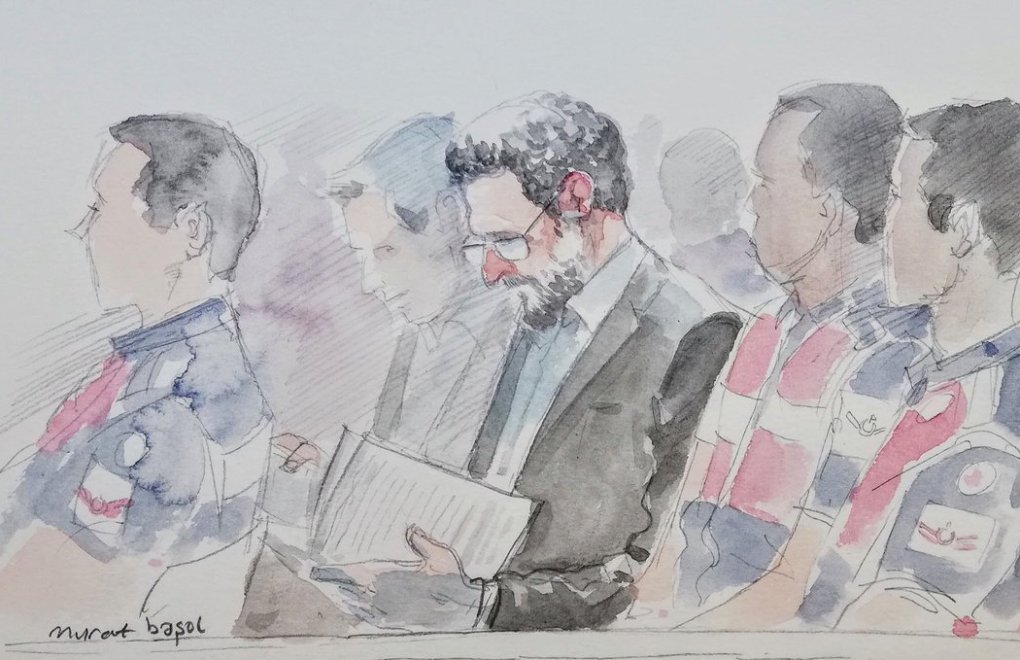
sa.jpg)
